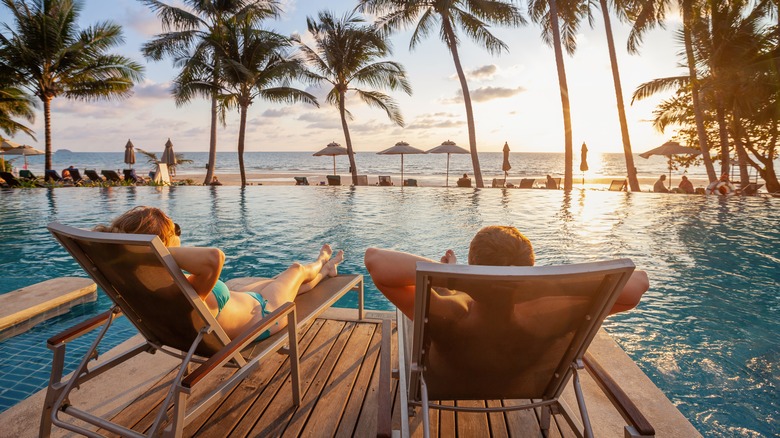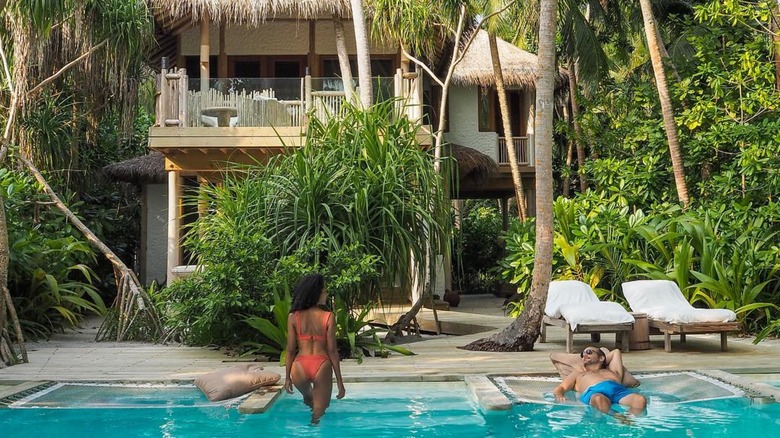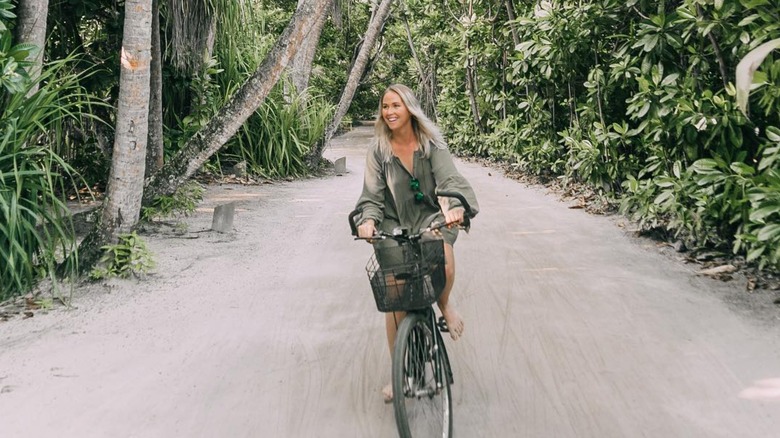This Resort On A Tropical Island Country Has Taken Revolutionary Steps To Become Mosquito-Free
You're lounging at the pool with a cocktail in hand, watching the sun set behind the vast blue ocean in front of you — and, periodically, you're slapping at the mosquitoes that continuously orbit your head. We've all had a perfect moment ruined by the buzzing bloodsuckers, but Soneva Fushi, a luxury resort in the Maldives, is committed to keeping the insects out. The resort is located on the small private Kunfunadhoo Island, situated deep in the Indian Ocean, where the humidity is regularly high, and the temperature remains balmy all year. Throw in annual monsoons, and the tropical destination becomes a breeding ground for pesky mosquitoes.
Suffering mosquito bites is the last thing many travelers want, especially if they pay upwards of $1,500 per night for a room, as is common at Soneva Fushi. The luxury hotel agrees with this sentiment and, as such, began an operation on the island in 2019 to eliminate mosquitoes. So far, its efforts haven't been in vain: The resort has seen an astounding 95% to 98% decrease in the disease-carrying pests. Without swarms of mosquitoes around to reproduce, Soneva Fushi is set to become the first mosquito-free resort in the Maldives.
How the island shrank its mosquito population
Soneva Fushi knew mosquitoes were a problem on its Maldives island and couldn't tackle them alone. The resort tapped Biogents, a company specializing in mosquito-elimination research and products. Together, the entities implemented a system that's effective yet kind to the environment. "We had been looking at ways to manage mosquitoes without the use of chemicals," Arnfinn Oines, Soneva's director of social and environmental consciousness, explained to CNN.
The resort's 500-plus mosquito traps exclude traditional pesticides and chemical foggers. Instead, these systems rely on technology that mimics human presence to attract mosquitoes searching for blood and catch egg-laying adults that have already bitten someone. This is all done without disturbing guests and surrounding wildlife.
While the system might be unconventional, it works for Kunfunadhoo Island. Just after the traps were installed, Soneva reported that up to 9,000 mosquitoes were caught per day, a number which has since waned as the population dwindles. Moreover, Culex, one of the two mosquito species that thrive on the island, has been almost completely eradicated using the Biogents method. Since the traps don't use chemicals that could create insecticide resistance, the system is expected to continue working until all mosquitoes have been exterminated.
What a mosquito-free island means for travelers
Soneva Fushi and Biogents' successful mosquito control is a major win for visitors who don't want itchy bites ruining their vacation. And more than being a nuisance, mosquitoes can carry dangerous illnesses and diseases. According to the Centers for Disease Control and Prevention, mosquitoes in the Maldives put tourists at risk of contracting chikungunya, dengue, and Zika. With fewer mosquitoes, staff and guests are less likely to get sick at the resort.
There's also the possibility for other destinations to follow suit. "If Soneva Fushi – a big jungly island with lots of people – can go mosquito free, then surely every other Maldivian island can too," Sonu Shivdasani, founder and CEO of Soneva Fushi, told GlobeTrender. "In fact, we have already started implementing the new mosquito control methods at Soneva Jani in Noonu atoll – which will hopefully become the second island in the Maldives to declare itself 'mosquito free.'" The resort chain plans to use its mosquito traps at Soneva Secret, which is set to open in 2024. Additionally, it gifted an insect-management system to Malé, the capital island of Maldives.
Besides benefitting travelers, the system has also supported the biodiversity at Soneva Fushi. Shivdasani noted that ditching chemical insecticides has allowed butterflies, bees, beetles, and other insects to thrive. As a result, more flowers and fruits are naturally growing on the island, and more birds are flocking to the area for food.


